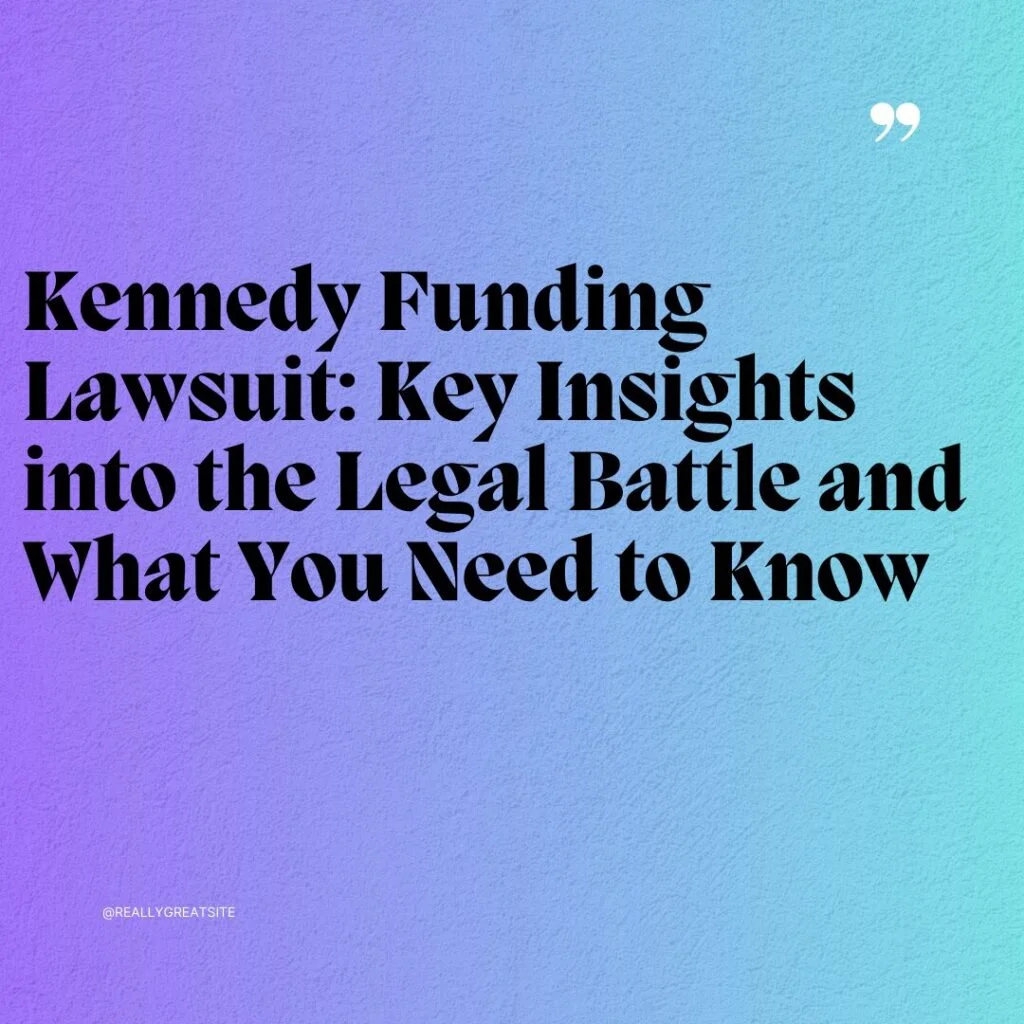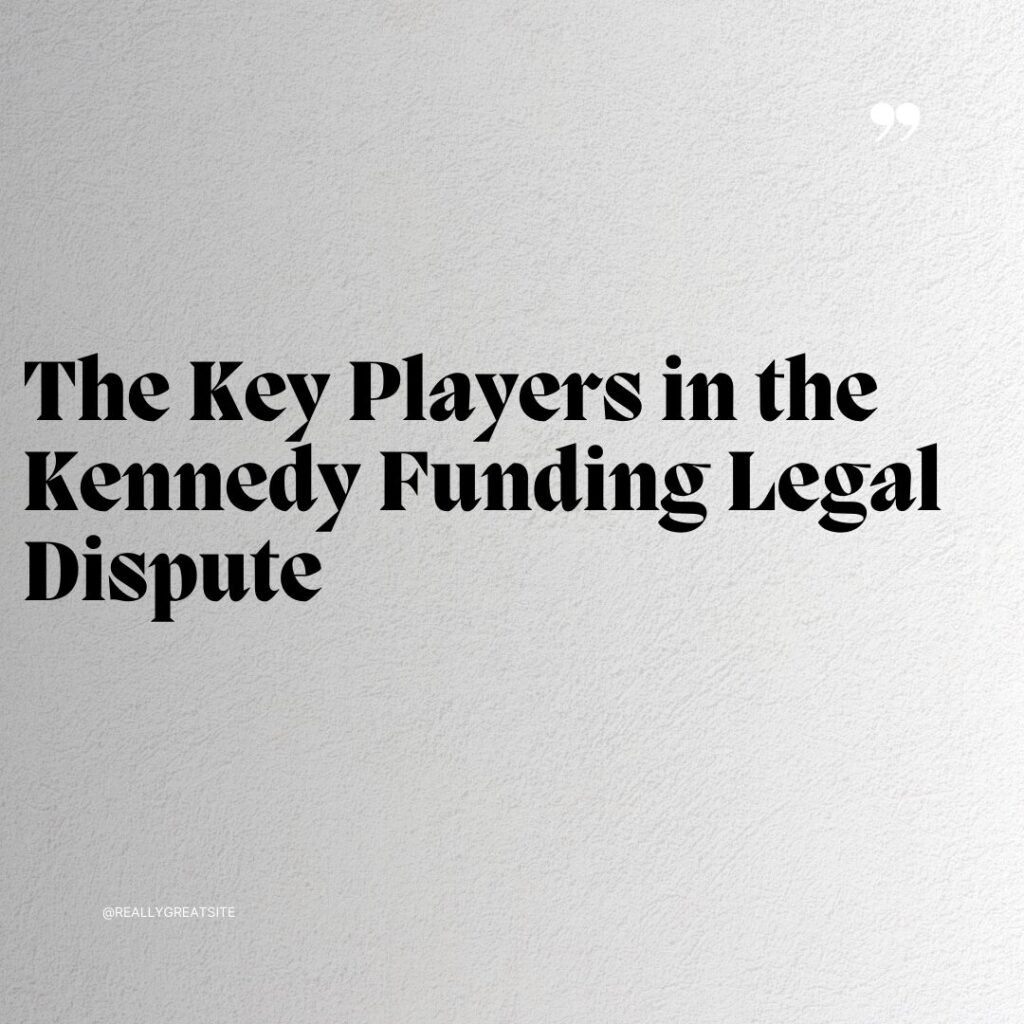
The Kennedy Funding lawsuit has recently garnered significant attention due to its complex legal implications and the high-profile nature of the involved parties. As one of the leading real estate lending firms, Kennedy Funding has been at the center of a legal dispute that has captured the interest of investors, legal professionals, and business owners alike. This lawsuit highlights the intricacies of financial transactions and the challenges that arise when large sums of money and contracts are involved.
Understanding the key points of this legal case is crucial for anyone who follows the real estate investment industry or is engaged in similar high-stakes transactions. Whether you’re an investor concerned about the impact on the market, a legal professional analyzing the specifics of the case, or simply someone intrigued by the business world, the Kennedy Funding lawsuit has significant lessons to offer. In this post, we’ll delve into the details of the lawsuit, its background, and what the outcome could mean for the industry moving forward.
Stay tuned as we break down the facts and implications of this case, shedding light on a situation that is sure to influence the future of real estate lending and legal battles in this field.
Understanding the Kennedy Funding Lawsuit: What’s at Stake?

The Kennedy Funding lawsuit has become a topic of intense discussion, not only for its legal complexity but also for its far-reaching implications within the real estate lending industry. The case involves Kennedy Funding, a major player in the world of commercial real estate finance, and revolves around a dispute that raises serious questions about lending practices, breach of contract, and investor relations. As the case moves forward, it’s important to understand the nature of the lawsuit, the key legal issues at play, and the potential impact on the industry as a whole.
This legal battle centers on allegations made by parties who claim that Kennedy Funding failed to honor certain terms of agreements. The case’s origins lie in complex financial transactions, where large sums of money were involved, and a series of missteps or misunderstandings led to a lawsuit. At the heart of the dispute are contractual obligations and how these were either misinterpreted or ignored. The case has drawn attention because it challenges long-standing practices in the commercial lending world, where legal disputes are not uncommon but rarely involve such a well-known firm.
One of the primary concerns in the lawsuit is the breach of contract allegations. These charges suggest that Kennedy Funding failed to meet the agreed-upon terms of their deals, leading to significant financial losses for the other party involved. Breach of contract claims are notoriously difficult to prove in court, especially in complex financial dealings, but the plaintiffs argue that there was clear evidence of negligence or failure to follow through with commitments made under the agreement.
Additionally, the lawsuit highlights the complexities of business-to-business lending. Real estate transactions often involve multiple parties, each with different interests and expectations, making it easy for disputes to arise. When these disputes result in a lawsuit, they can affect not only the companies directly involved but also have ripple effects throughout the industry. Investors, lenders, and borrowers alike may find themselves scrutinizing their own contracts more carefully, fearing that similar legal challenges could arise in their own dealings.
Another significant aspect of the Kennedy Funding lawsuit is its potential to affect investor confidence in commercial real estate financing. The reputation of firms involved in high-profile lawsuits can be tarnished, leading to a decrease in future business or a reluctance from investors to engage in similar transactions. The financial community is keenly watching the case to see if the outcome will set a precedent for how similar cases will be handled in the future. A ruling against Kennedy Funding could alter the way lending agreements are drafted and enforced, introducing more stringent protections for all parties involved.
The Role of Contractual Agreements in the Kennedy Funding Lawsuit
At the core of the Kennedy Funding lawsuit are the contractual agreements that were allegedly violated. In many financial transactions, these contracts serve as the guiding document, dictating the terms and conditions that both parties agree to follow. When one party fails to meet these obligations, as is claimed in this case, it can lead to significant legal action. The specifics of the contract, such as deadlines, payment schedules, and loan terms, will be critical in determining the outcome of the case.
Key Legal Issues in the Kennedy Funding Case
Beyond the breach of contract claims, the Kennedy Funding lawsuit involves a number of other legal issues. Questions surrounding fiduciary duties, negligence, and potential fraud have been raised. These legal concepts are essential in understanding the case’s broader implications, especially as they pertain to the responsibilities of lenders and the expectations they must meet when entering into large-scale financial agreements.
Potential Impact on the Real Estate Lending Industry
The outcome of the Kennedy Funding lawsuit could have far-reaching consequences for the real estate lending industry. If the court rules in favor of the plaintiffs, it may signal a shift in how contracts are interpreted and enforced within the commercial lending sector. On the other hand, if Kennedy Funding prevails, it could affirm existing practices, reassuring other lenders that the legal framework surrounding these transactions is sound. Either way, the case will likely set a precedent for future litigation in the real estate finance world.
How the Lawsuit Reflects Broader Trends in Commercial Lending
This lawsuit is not an isolated incident but rather part of a larger trend in commercial lending where disputes over terms, payments, and contracts are becoming more frequent. As the real estate market becomes increasingly complex, the likelihood of legal challenges also grows. The Kennedy Funding case serves as a reminder of the challenges that arise in high-stakes financial deals, and it may prompt other firms to reevaluate their own legal strategies and risk management practices.
The Importance of Legal Precedent in Real Estate Lending Disputes
In the world of real estate lending, legal precedents play a significant role in shaping future agreements and disputes. The Kennedy Funding lawsuit has the potential to become a landmark case, setting a new legal standard for how commercial lenders and borrowers must conduct themselves. The outcome of the case could lead to more rigid contract structures, enhanced protections for investors, or more aggressive enforcement of terms.
How Investors Are Responding to the Kennedy Funding Lawsuit
Investors closely following the Kennedy Funding lawsuit are concerned about the long-term implications for their own portfolios. If the lawsuit results in a ruling that damages the reputation of the company or calls its lending practices into question, it could trigger a shift in investor behavior. Confidence in Kennedy Funding and similar companies might diminish, leading to a more cautious approach to investments in the commercial real estate market.
Kennedy Funding’s Reputation and Business Operations Moving Forward
Regardless of the outcome, the Kennedy Funding lawsuit is likely to affect the company’s reputation for years to come. If they lose the case, it could harm their standing in the market, affecting client relationships and future business prospects. If they win, the company may be able to recover, but the legal costs and public attention will still have long-term effects. The lawsuit is, therefore, a pivotal moment for the company, with its future success potentially hinging on the court’s decision.
What’s Next for the Kennedy Funding Lawsuit?
The Kennedy Funding lawsuit is more than just a legal dispute—it’s a reflection of the risks and complexities involved in large-scale commercial lending. As the case unfolds, it will provide valuable insights into how such disputes are handled and the potential consequences for the industry. Whether you’re an investor, lender, or borrower, the outcome of this lawsuit is sure to impact the way financial transactions are approached in the future.
The Key Players in the Kennedy Funding Legal Dispute

The Kennedy Funding lawsuit involves a complex array of key players, each of whom plays a significant role in the unfolding legal drama. To understand the full scope of the case, it’s essential to look at the individuals and entities involved, from the plaintiff to the defendant and other stakeholders. These key players are central to the allegations, legal arguments, and the ultimate outcome of the lawsuit.
Kennedy Funding, LLC: The Defendant
At the heart of the legal dispute is Kennedy Funding, LLC, a prominent private real estate lender known for providing large-scale loans to property developers and real estate investors. With a reputation for offering fast and flexible financing solutions, the company has had a significant presence in the commercial lending market. However, the lawsuit centers on accusations that the company may have engaged in unfair business practices, leading to a legal showdown with other parties involved.
The Plaintiff: Alleged Parties Taking Legal Action
On the other side of the case is the plaintiff, which represents the parties who have filed the lawsuit against Kennedy Funding. While the names of the plaintiffs may vary depending on the specific details of the case, they are typically investors or business entities that claim to have been wronged by the company’s actions. These plaintiffs argue that Kennedy Funding violated certain terms of the agreements, potentially causing financial harm.
Legal Counsel Representing Kennedy Funding
Every major lawsuit involves legal teams, and Kennedy Funding’s legal counsel is no exception. The company has hired experienced attorneys to defend its interests and argue against the claims brought by the plaintiffs. The lawyers representing Kennedy Funding are tasked with challenging the accusations, potentially seeking to have the case dismissed or negotiating a settlement that works in their favor.
Legal Representation for the Plaintiffs
The plaintiffs’ legal team is responsible for presenting the case against Kennedy Funding. This team works to prove that their clients were wronged, whether through breach of contract, deceptive business practices, or other claims. They will need to gather evidence, build a compelling case, and argue their points in court to secure a favorable outcome for their clients.
Investors and Lenders Involved in the Case
Apart from the direct parties, several investors and lenders may be impacted by the outcome of the Kennedy Funding lawsuit. These individuals or groups often play a secondary role in the case, either as potential witnesses or as stakeholders who have a vested interest in the result. Their financial involvement can significantly influence how the case is perceived and the broader implications it may have for the industry.
The Real Estate Market Stakeholders
The real estate market itself is a key player in the background of the Kennedy Funding lawsuit. The case revolves around financial transactions within the real estate sector, meaning that the actions and consequences of the lawsuit may have a ripple effect across the broader market. Real estate developers, investors, and other market players are all watching the case closely, as it could set a precedent for future legal disputes in the industry.
Regulatory Authorities
While the Kennedy Funding lawsuit is primarily a civil case between private parties, regulatory authorities such as financial oversight bodies may become involved depending on the nature of the allegations. If the case touches on issues such as lending practices, financial regulations, or industry standards, government agencies might step in to monitor the proceedings or even take enforcement action based on the outcome of the case.
Industry Experts and Analysts
In addition to the parties directly involved, industry experts and analysts provide insights into the lawsuit’s significance and its potential impact on the real estate and lending sectors. These experts may not be formally involved in the case but can shape public opinion and influence how the case is understood. Their analyses are especially valuable in predicting how similar cases might unfold in the future.
Public Opinion and Media Coverage
The media and public also play a role in the Kennedy Funding lawsuit. The case has been the subject of news reports, industry publications, and online discussions, which can influence how the parties are perceived and how the case progresses. Public sentiment, fueled by media coverage, may even have an indirect impact on settlement negotiations or public statements made by the key players.
Potential Future Legal Cases
Finally, the outcome of the Kennedy Funding lawsuit could set a precedent for future legal cases in the real estate lending industry. Whether the case involves violations of contractual obligations, lending practices, or investor rights, the decision could influence how future disputes in this sector are handled. Legal experts, as well as industry participants, will closely monitor the ruling to understand how it might shape future litigation.
The involvement of these key players creates a dynamic legal environment in the Kennedy Funding lawsuit, and their roles are essential to understanding how the case may evolve. As the legal proceedings continue, it’s important to watch how each of these parties interacts and what impact their actions might have on the outcome of this high-profile dispute.
Legal Implications of the Kennedy Funding Lawsuit: A Closer Look
The Kennedy Funding lawsuit has sparked significant legal discussions within the real estate and financial sectors, as its ramifications could reshape business practices and regulatory approaches for years to come. The case centers on several complex financial disputes involving one of the industry’s largest private lending firms, Kennedy Funding, which is known for its substantial loans to commercial real estate developers. The legal conflict emerged when parties involved in various deals claimed the firm engaged in misleading practices or failed to fulfill contractual obligations, leading to extensive litigation.
The primary legal issue surrounding this lawsuit is whether Kennedy Funding misrepresented or failed to deliver on promises made to borrowers and investors. These kinds of financial missteps can lead to breaches of contract, fraud allegations, and violations of securities law. As the case progresses, it is crucial to understand how such allegations could affect Kennedy Funding’s future operations, as well as the overall lending environment.
A key element of the lawsuit revolves around the interpretation of loan agreements and the enforceability of certain terms. If the court rules that Kennedy Funding acted in bad faith or failed to uphold its contractual obligations, this could lead to substantial penalties or a forced restructuring of the company’s business practices. The outcome could influence how financial institutions draft and enforce their loan agreements, potentially leading to stricter oversight in the private lending industry.
Another important factor is the potential impact on investors who hold stakes in Kennedy Funding. Should the lawsuit result in significant financial penalties or a settlement that affects the company’s profitability, shareholders and investors might face financial losses. This ripple effect could also result in diminished confidence in the real estate lending market, especially in private lending sectors that thrive on trust and long-term relationships between lenders and borrowers.
Additionally, the Kennedy Funding lawsuit underscores the growing concerns about transparency within the private lending space. Investors and borrowers alike are becoming increasingly wary of potential financial mismanagement or hidden risks associated with large lending firms. Legal outcomes from this case could set precedents for future disclosures and reporting requirements, pushing for greater accountability and clearer communication between lenders and their clients.
In terms of regulatory ramifications, this lawsuit could lead to heightened scrutiny of private lending firms by government bodies, including the Securities and Exchange Commission (SEC) and the Federal Reserve. These institutions could introduce new rules or regulations to prevent future legal disputes, particularly those involving deceptive lending practices. In turn, private lenders might have to adjust their business models to align with new legal standards, which could involve revising loan agreements, enhancing due diligence practices, and increasing oversight of their financial operations.
For real estate developers and borrowers who are currently engaged with Kennedy Funding or similar firms, the ongoing lawsuit presents a cautionary tale. It serves as a reminder that even in the world of high-stakes commercial real estate transactions, legal risks can have profound effects on financing and project timelines. Borrowers need to carefully assess the terms of their agreements and consider the financial stability of their lenders before proceeding with any significant real estate ventures.
The resolution of the Kennedy Funding lawsuit could have a broader influence on the ways in which financial institutions approach risk management and lending strategies. If the lawsuit leads to significant settlements or judgments against the company, other lending firms may adopt more conservative practices to avoid similar legal disputes. This could result in tighter lending standards, more conservative loan-to-value ratios, and a general reevaluation of risk in the private lending market.
One of the most pressing concerns for both borrowers and investors is the possibility of long-lasting reputational damage to Kennedy Funding. A ruling against the firm could tarnish its reputation, making it more difficult to attract future business or secure new investment capital. This loss of trust could create a ripple effect throughout the lending industry, influencing borrowers’ willingness to work with private lenders or pursue alternative financing options.
the legal implications of the Kennedy Funding lawsuit are far-reaching and complex, with the potential to reshape not only the company’s future but also the broader landscape of real estate lending. As the case continues to unfold, industry stakeholders will need to closely monitor developments to understand how this lawsuit might influence future business practices, regulatory oversight, and the relationships between lenders, investors, and borrowers in the real estate market.
How the Kennedy Funding Lawsuit Could Impact the Real Estate Lending Industry
The Kennedy Funding lawsuit has raised important questions about the future of real estate lending and the stability of financial institutions involved in high-value transactions. As a major player in the real estate investment and lending sector, Kennedy Funding’s legal troubles could have far-reaching consequences. The outcome of this case may reshape how lenders, borrowers, and investors approach future deals. In this post, we explore the potential impacts of the lawsuit on the real estate lending industry.
Increased Scrutiny on Real Estate Lenders
One of the most immediate impacts of the Kennedy Funding lawsuit is the potential for increased scrutiny on lenders in the real estate market. Financial regulators, concerned about the legal challenges faced by a prominent lender, may begin to enforce stricter regulations. These could include more detailed background checks on lenders and more transparent reporting requirements to prevent similar legal issues from arising in the future.
Higher Risk for Private Lenders
Private lenders, like Kennedy Funding, could face more challenges in the wake of the lawsuit. If the case results in negative publicity or penalties, private lenders may find it harder to secure funding for their projects. The Kennedy Funding lawsuit could raise awareness of the risks involved in private lending, making investors more cautious and less willing to fund these types of ventures.
Impact on Borrowers and Loan Agreements
For borrowers, the outcome of the lawsuit could mean revisions to how loan agreements are structured in the future. Lenders might adopt more stringent terms, including higher interest rates, tighter repayment schedules, or additional guarantees, to protect themselves from legal risks. This could make it more difficult for borrowers to secure favorable loan terms, especially for those who rely on private lenders like Kennedy Funding.
Increased Legal Costs in the Lending Process
If the Kennedy Funding lawsuit results in a financial settlement or changes to industry practices, it could drive up the legal costs associated with real estate lending. Both lenders and borrowers may need to invest more in legal resources to navigate the evolving landscape. This could include more extensive due diligence, higher fees for contract negotiation, and greater reliance on legal professionals to ensure compliance with new regulations.
Shifting Investor Confidence in Real Estate Lending
Investor confidence in the real estate lending industry may take a hit due to the ongoing Kennedy Funding lawsuit. If the case exposes vulnerabilities in the lending practices of high-profile firms, investors may become more reluctant to fund real estate projects. The negative publicity surrounding the lawsuit could lead to hesitation among institutional investors, which might limit the amount of capital available for future lending deals.
Potential for New Industry Standards
In response to the Kennedy Funding lawsuit, the real estate lending industry might adopt new standards and practices to mitigate legal risks. These could include more thorough contract reviews, standardized due diligence processes, and greater transparency in loan agreements. Such changes would aim to protect both lenders and borrowers while ensuring that real estate transactions are conducted in a legally sound manner.
Impact on Commercial Real Estate Projects
Large-scale commercial real estate projects, which often rely on high-value loans from firms like Kennedy Funding, could see delays or changes in funding structures as a result of the lawsuit. Developers may struggle to secure financing for their projects, particularly if lenders become more cautious following the legal proceedings. This could slow down the pace of new commercial developments, potentially affecting the broader economy in the process.
Repercussions for Real Estate Investment Trusts (REITs)
Real Estate Investment Trusts (REITs), which are major players in the real estate sector, could also feel the effects of the Kennedy Funding lawsuit. If private lending becomes more regulated or restricted, REITs that rely on these types of loans may face challenges in obtaining financing for their portfolios. This could lead to a ripple effect in the real estate market, as REITs may need to adjust their investment strategies or look for alternative funding sources.
Longer-Term Effects on the Industry’s Reputation
Over the long term, the Kennedy Funding lawsuit could tarnish the reputation of the real estate lending industry. Public perception of the sector may be negatively impacted, especially if the case reveals unethical practices or financial mismanagement. This could make it more difficult for lenders to build trust with borrowers and investors, leading to a decline in the volume of real estate deals.
The Role of Legal Precedents in Future Lending Disputes
Lastly, the Kennedy Funding lawsuit may set important legal precedents that influence future lending disputes. Depending on the outcome, courts could establish new legal standards for handling real estate lending cases, which could affect how similar cases are resolved in the future. This could lead to changes in the legal landscape of real estate finance, requiring lenders and borrowers to adapt to new rules and guidelines.
the Kennedy Funding lawsuit stands to have a lasting impact on the real estate lending industry. Whether it leads to stricter regulations, shifts in investor confidence, or changes in lending practices, the case will likely shape the future of the industry in significant ways. As the lawsuit unfolds, all stakeholders in the real estate market—lenders, borrowers, investors, and legal professionals—must remain vigilant and adaptable to the changing landscape.
What Investors Should Know About the Ongoing Kennedy Funding Lawsuit
The Kennedy Funding lawsuit is a significant legal case with far-reaching implications for both the financial and real estate sectors. As an investor, understanding the nuances of this case is crucial for protecting your interests and staying informed about potential risks. The lawsuit involves a dispute between Kennedy Funding, a prominent real estate lender, and various entities that were involved in large-scale property transactions. The outcome of this case could influence lending practices, property valuations, and even investor strategies in the future.
1. Overview of the Kennedy Funding Lawsuit
At the heart of this lawsuit is a financial disagreement between Kennedy Funding and a group of borrowers who are involved in real estate projects. These projects, some of which involve multi-million dollar properties, have been the subject of litigation due to disputes over loan terms, repayment schedules, and alleged breaches of contract. As an investor, it’s essential to recognize how these types of lawsuits can impact the lending environment and the broader market.
2. The Impact of the Lawsuit on Kennedy Funding’s Operations
Kennedy Funding is one of the most well-known real estate lenders in the industry. As such, any legal battle involving the company has the potential to affect its operations and future business. While the company has continued to operate throughout the course of the lawsuit, prolonged legal disputes could affect its creditworthiness and lending capacity. For investors holding shares in the company or involved in similar ventures, the lawsuit could signal potential instability.
3. How the Outcome Could Affect Real Estate Lending Practices
Real estate lenders often rely on a combination of interest rates, repayment terms, and borrower creditworthiness to make lending decisions. The Kennedy Funding lawsuit could alter the way loans are structured in the future, especially in high-risk real estate deals. Should the court rule in favor of the plaintiffs, it could lead to stricter regulations or changes in the way that real estate loans are issued, impacting the entire lending ecosystem.
4. Potential Financial Consequences for Investors
The financial ramifications of the Kennedy Funding lawsuit could be significant for investors. If the ruling is not favorable to Kennedy Funding, the company might be required to pay hefty damages, which could lead to a decline in stock value or changes in investor confidence. In addition, real estate projects associated with the company could experience delays or financial setbacks, which could trickle down to investors who are indirectly tied to these developments.
5. The Role of Legal Precedents in the Case
A critical aspect of the Kennedy Funding lawsuit is how it could set legal precedents for future disputes in real estate lending. For example, the outcome may clarify certain terms and conditions regarding loan agreements and borrower obligations, particularly in situations where large-scale properties are involved. This could affect how similar cases are handled going forward and offer investors insight into the future landscape of real estate lending and litigation.
6. What This Lawsuit Means for Borrowers and Lenders
Both borrowers and lenders are closely watching the outcome of the Kennedy Funding lawsuit. If the case results in significant changes to how loan terms are enforced or how disputes are resolved, it could redefine the relationship between these two parties. Investors who hold interests in either real estate properties or lending companies should consider how these changes could affect their portfolios and future investments.
7. The Potential Long-Term Effects on Market Confidence
Legal disputes such as the Kennedy Funding lawsuit can shake investor confidence, especially if they involve large, established companies. The longer the case drags on, the more it may affect market sentiment. If investors begin to see Kennedy Funding’s legal issues as a sign of instability or mismanagement, it could have a ripple effect on other companies in the real estate sector, potentially affecting property prices and market conditions.
8. Risk Management Strategies for Investors
Given the uncertainty surrounding the Kennedy Funding lawsuit, investors must adopt risk management strategies to safeguard their assets. Diversifying investments across various industries and regions can help mitigate the potential financial fallout from a negative court ruling. Investors should also consider consulting with legal and financial advisors to evaluate the potential risks associated with their current portfolios.
9. Tracking the Lawsuit’s Progress and Adjusting Strategies
For investors who are directly involved with Kennedy Funding or the properties affected by the lawsuit, staying updated on the progress of the case is essential. This can help in making informed decisions about buying, selling, or holding investments. Monitoring legal updates, company press releases, and expert analyses will allow investors to adjust their strategies based on the latest developments in the case.
10. Final Thoughts on the Kennedy Funding Lawsuit for Investors
The Kennedy Funding lawsuit serves as a reminder of the complexities of real estate investments and the potential risks that come with large financial transactions. While the outcome of the case is still uncertain, investors must remain vigilant and prepared to respond to any shifts in the market or changes in lending practices. Understanding the full scope of the lawsuit and its potential consequences is key to making informed investment decisions in these turbulent times.
| Aspect | Details |
|---|---|
| Overview of the Lawsuit | Dispute between Kennedy Funding and borrowers over loan terms and property transactions. |
| Key Parties Involved | Kennedy Funding, a real estate lender, and multiple borrowers in high-value property deals. |
| Impact on Kennedy Funding | Potential reputational damage, financial strain, and possible changes in business operations. |
| Legal Precedents | Potential for new rulings that affect future real estate lending practices and contract disputes. |
| Financial Implications for Investors | Stock fluctuations, potential damage payments, and disruptions to property development timelines. |
| Impact on Real Estate Lending | Changes in lending practices, loan structures, and borrower obligations could follow. |
| Risks for Investors | Decreased market confidence, potential loss of investment value, and financial instability. |
| Risk Management Strategies | Diversification, legal consultation, and constant monitoring of lawsuit developments are recommended. |
| Long-Term Market Effects | Possible changes in investor confidence and industry regulations that could impact property values. |
| How to Stay Informed | Regularly check legal updates, company statements, and industry analyses to adjust investment strategies. |
Conclusion
The ongoing Kennedy Funding lawsuit serves as a significant reminder of the complexities and risks involved in real estate investments and lending. As the legal dispute unfolds, it has the potential to reshape lending practices, set new legal precedents, and create ripple effects across the industry. For investors, staying informed and prepared for the potential outcomes is essential to minimizing risk and making smart, strategic decisions.
Whether you’re directly invested in Kennedy Funding or simply monitoring the case from the sidelines, understanding the potential financial, legal, and market implications is crucial. The lawsuit underscores the importance of risk management strategies, such as diversification and constant monitoring of legal developments. By keeping an eye on the case and adapting to its progress, investors can better navigate the uncertain waters of this high-profile legal battle and protect their financial interests moving forward.
- What is the Kennedy Funding lawsuit about? The Kennedy Funding lawsuit revolves around a legal dispute between the real estate lender, Kennedy Funding, and several borrowers over loan terms, repayments, and alleged breaches of contract. The case is drawing attention due to its potential impact on real estate lending practices and financial regulations.
- How could the Kennedy Funding lawsuit affect investors? The outcome of the Kennedy Funding lawsuit could have significant implications for investors, especially those involved in real estate lending or holding shares in Kennedy Funding. A negative ruling might lead to financial instability for the company, affect property valuations, and alter market confidence, impacting investor strategies.
- What are the potential legal outcomes of the Kennedy Funding lawsuit? The Kennedy Funding lawsuit could result in various legal outcomes, including changes to loan agreements, regulatory updates, and potentially new precedents for resolving similar disputes. These outcomes could reshape how lenders and borrowers approach contracts in the future, especially in large-scale real estate deals.
- What risk management strategies should investors consider due to the lawsuit? In light of the Kennedy Funding lawsuit, investors should consider diversifying their portfolios, staying updated on legal developments, and consulting with financial experts. Monitoring the case closely will allow investors to adjust their strategies and mitigate any potential risks associated with the lawsuit’s outcome.
- How can the Kennedy Funding lawsuit impact the real estate lending industry? The Kennedy Funding lawsuit could lead to changes in the way real estate loans are structured and enforced. If the lawsuit results in a ruling that affects lending practices, it may influence how future loans are issued, altering industry standards and potentially tightening regulations in the real estate lending market.






